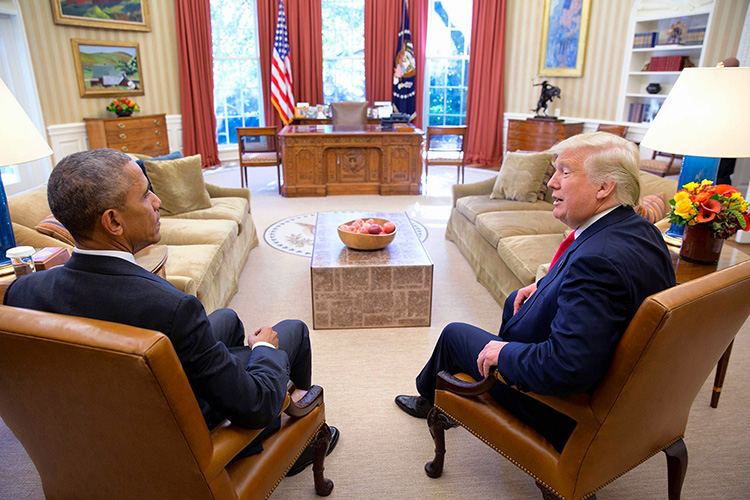How do we talk politics in these heated times?
Dan Lindheim, a professor at the Goldman School of Public Policy and an expert on political civility, talks about a way forward
October 26, 2018

Political opponents should focus on talking issues, not partisan politics, a UC Berkeley professor argues. (Image courtesy whitehouse.gov//Wikimedia Commons)
Talking issues – not tribal, partisan politics – is key to mending the fractious, sometimes violent, state of American political discourse, according to the head of UC Berkeley’s Center on Civility & Democratic Engagement.
Dan Lindheim, a professor at the Goldman School of Public Policy, argues that citizens and politicians alike need to listen less to social media and cable news and focus more on finding issues that affect all of us, and then working together to solve them.
“In the Bay Area we can all agree that rents are too damn high,” he said, using an example of a problem without dispute that still divides many in the Bay Area . “Whatever the result, both sides need to come together to solve the crisis of housing affordability and not see each other as enemies.’”
Stretch discussions like that out to the national level, Lindheim says, and instead of yelling about the latest political twist we could instead be debating strategies to revitalize the Rust Belt economy or help people avoid going bankrupt when they get sick.
But how do we get there when facts have little significance and politicians are eager to play to their more loyal supporters? There’s no easy answer.
“The biggest issue is that the current environment has enabled people to say things and take actions that they might not otherwise do, or felt support for,” Lindheim said.” That’s why I say all political figures have a responsibility to understand that what they say has consequences.”
Berkeley News spoke with Lindheim about the bombs delivered on Thursday, free speech on the UC Berkeley campus and whether there’s hope for American discourse.
What do you make of this moment we’re in now, with bombs being delivered to a number of Democratic politicians and other critics of President Trump on Wednesday, especially coming after the shooting at the Congressional baseball game last year and the shooting of Gabby Giffords a few years ago?
Clearly the political debate has become so hateful and so distrusting and that it allows people — and I presume unstable people — to do awful things. I think any political figure has to bear some responsibility for that. Knowing that there are unstable people out there, they have to be careful about what they say and how they say it. There are dog whistles that are intentional on the part of certain political figures to excite excitable people. I am reluctant to jump to that conclusion right now because the motives of the bomber have not been identified, but I think people have to be very mindful that words matter and words they have consequences.
The biggest issue is that the current environment has enabled people to take actions that they might not otherwise do, or felt support for. That’s why I say all political figures have a responsibility to understand that what they say has consequences.
Is this something new in our politics? How does this moment fit into context?
I don’t think it’s completely new. The antecedents of this go way back to the 60s and Nixon’s Southern strategy”. The other piece is the racial and political gerrymandering we’ve seen for the last 10 years, the ability to figure out maps where you can you can slice and dice — pack and crack is the terminology — people into safe districts, where they have zero incentive to reach across the political divides.
You’ve spent the last year on campus trying to improve our political dialogue with each other after a few years of difficult political conversations. What have you learned?
In private you can bring people who disagree together to talk about meaningful and substantive issues. The problem is when you put a microphone in people’s face they suddenly become stupid, and by that I mean irrational. You see this with lots of politicians and lots of public figures.
People play to their constituencies in public and they feel a responsibility to do so.
Given your experience on campus trying to bring people together, what is your prescription for us as a nation? What can we do as citizens, or is it up to politicians?
My colleague Robert Reich says don’t use labels. Talk to people about their concerns, about the concerns of their families. If you go back to the 2016 election, lots of people were torn between voting for Trump or voting for Bernie. Now that initially defies explanation, but people were feeling a common sense that the economy was leaving them behind and the political establishments, on both sides, weren’t speaking to their realities –and they just weren’t sure which way to go, except to vote against what they saw as the status quo..
Talking about issues is a much better way than talking partisan politics, because once you start talking labels, then everybody goes to their own tribe.
So focus on the policy, or the policy outcome instead of the tribe you identify with?
Right. So one of the things I want to do with our Center is bring people with opposing viewpoints together to talk about substantive issues. Earlier this year we had Robert Reich debate Stephen Moore, a conservative thinker who claims paternity for the Trump tax bill.
But how do we talk about that policy when everybody has a different truth or we can’t agree on the facts from the very beginning?
Well that’s one of the difficult issues when you have a policy environment where facts don’t matter. I can’t suggest much that is helpful if people can’t agree on basic realities. Part of it is that on social media and certain news sources articulate outlandish positions. One side will respond outlandishly to the outlandish positions of another. I think an absolute first step is to have a political environment where facts matter. But how, in this current environment, do we get there? I don’t have a magic potion for that.
The national administration is succeeding by playing to peoples legitimate fears and concerns and then offering incorrect facts and incorrect analyses of why these things are occurring. As long as that continues, there’s no reason why they’re going to change a game that have proved successful.
Do you think we’re going to be OK, as a country?
I don’t know. I think the partisan gerrymandering has made it impossible to have substantive debate in most Congressional districts. There is no incentive in reaching across the aisle because really the threat is coming from your extreme, the further left if you’re a Dem and the further right if you’re a Republican. Some 90 percent of districts are super safe from a partisan perspective, so there is no incentive to reach across the aisle or be more moderate and inclusive.
The Republicans have had a strategy for a long period of time to win control of the statehouses and control redistricting. They’ve been very successful. The Democrats have not. So it is not only that elections have consequences, it’s also that strategy has consequences.
Reporters interested in interviewing Lindheim can reach Will Kane at [email protected]
